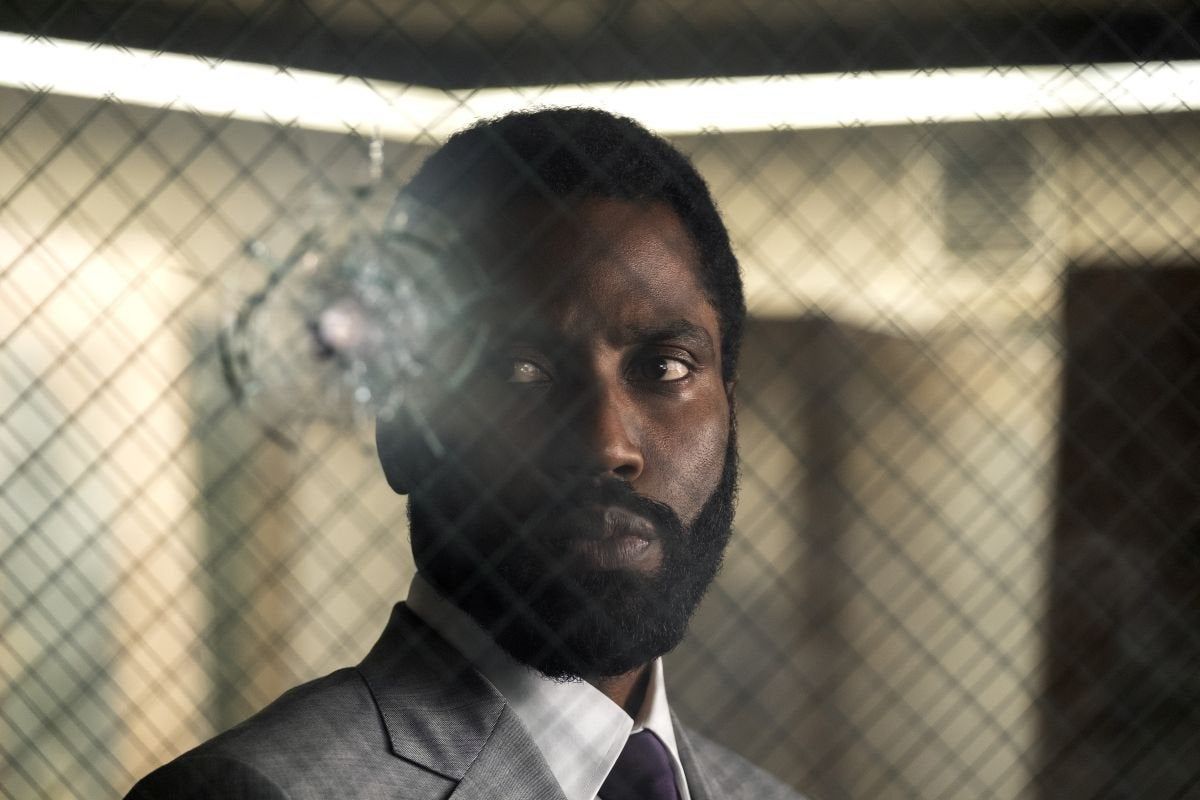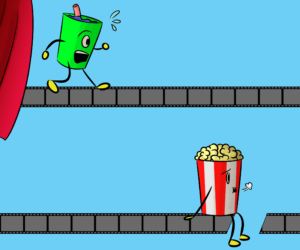Movies are back! Well, they are according to this instantly iconic clip of Tom Cruise going to the theater to see Christopher Nolan’s newest film, Tenet (2020). The bizarre video posted to Cruise’s Twitter account documents his journey to a socially distanced London cinema to see a film on the big screen after months in lockdown due to COVID-19. Though only 34 seconds long, the clip feels like a fever dream of Cruise’s idea of an advertisement not for Tenet but for the movie-going experience itself.
Many film lovers in the United States are not yet able to join Cruise in his celebration of cinema’s triumphant return. To release Tenet at this early stage in the country’s reopening implies that Warner Bros. felt confident that viewers in the states where theater restrictions have been lifted would be willing to show up for a big-budget action thriller after months of streaming movies in their living rooms. After two weeks in theaters, Tenet has grossed under $30 million domestically, which is a concerning result for a film from a brand-name auteur like Nolan, even when factoring in the New York and L.A. markets still being closed. Despite the disappointing U.S. box office returns, the film has crossed the $200 million line internationally. The question of whether it is safe to go to a movie theater seems to have a clearer answer overseas, but in America there is still much uncertainty surrounding the safety of seeing Tenet, with some critics taking a stance by opting not to review the film at all.
The reviews from critics who have chosen to see Tenet have been uneven, to say the least. Some say its convoluted plot is indecipherable and that it is one of Nolan’s worst films. Others, like rapper Travis Scott, say it is “very fire.” What they all share is the acknowledgment that it is 2020’s most important release—the performance of which could signal how the theater industry might survive the pandemic. People considering a return to cinemas may be wondering if seeing Tenet is worth the risk to their health. That is an unattainable bar for any film, as going to the movies is nonessential and should never come before safety. That said, for those who have access, feel comfortable, and are ready to end their long hiatus from theaters, Tenet should be the first film they see—not because its competitors (ie. New Mutants, Unhinged) are weak, but because its high concept story and large-scale set pieces make for a visually and aurally arresting experience that is all the more thrilling after months away from the big screen.
My personal experience seeing Tenet was overwhelming for a number of reasons. Going to the movies is one of my favorite things to do, and I especially felt its absence during this long summer in quarantine. After driving an hour from my home in New York to the nearest AMC open in Connecticut, I finally laid eyes on those ugly multicolored carpets for the first time in over six months. I happily paid way too much for way too little popcorn and made my way to my seat, which was distanced several posts from the nearest moviegoer. My pulse started racing even before the film began, as a sneak-peek teaser for the upcoming Dune (2020) remake hit the screen. Seeing a preview that was not available on YouTube, Twitter, or anywhere other than in that theater at that time reminded me of how the exclusivity of going to the movies elevates it from a mere activity to a true event. Once the film began, my senses were overstimulated by the sights and sounds of explosions, fistfights, and car chases. I excitedly looked over at my friend after each mind-bending twist to see her reaction, or as much of her reaction as I could perceive from the part of her face not covered by her mask. Many of the film’s characters also wear masks in certain scenes, which creates an eerily experiential effect for viewers wearing masks of their own. Having conceived the idea for Tenet several years ago, Nolan could not have possibly known the additional resonance those masks would take on in 2020—unless he gained the ability to time travel like a character in one of his own films.
Those who have explored Nolan’s filmography are familiar with the director’s obsession with time. Inception (2010) and Interstellar (2014) are two of his most successful films that toy with time while also insisting upon deep, emotional statements about human nature. However, when Nolan tries to simultaneously play around with his high concept ideas and emphasize big, weighty themes of trauma, love, and family, the results do not always jell together into a cohesive film. Where Tenet excels is in its simplicity, which, if you’ve seen the film, is an incredibly ironic statement. Without revealing too much of the plot, Tenet follows a CIA operative (John David Washington) who investigates “inverted” objects that somehow travel backward in time. As the film’s runtime extends, this concept of inversion increasingly complicates the story and will make your head hurt if you try to unpack everything that is happening upon first viewing.
A scientist played by Clémence Poésy delivers a line during her first explanation of inversion to the protagonist that provides the audience with the best advice for watching the film: “Don’t try to understand it. Feel it.” Attempting to comprehend every bit of hastily explained, pseudo-scientific logic is like trying to drink from a firehose; it is much easier, and more fulfilling, to just let the spectacle wash over you. Having seemingly developed some self-awareness of his own brand, Nolan strips this story of those self-serious themes to provide plenty of room to let his big idea reach its full, disorienting potential. What is left is a hidden simplicity that makes just enough sense on the surface so that viewers can decide whether they want to sit back and enjoy the massively entertaining action or more obsessively dig into the story’s minutiae, which is the type of intense fandom that the filmmaker is often known to inspire.
For years, Nolan has been vocal about his desire to make a James Bond film. Inception had shades of Nolan’s affection for the Bond series with its dreamlike globetrotting and elaborate ski-chases, but Tenet goes even further in its evocations of the iconic British super-spy. John David Washington, essentially playing a version of Bond, cements himself as an abundantly capable leading man (and distances himself from his father Denzel’s shadow). Washington is effortlessly athletic and genuinely cool, even in the narrative’s most nonsensical moments. After the introduction of Neil (Robert Pattinson), another charming and impeccably dressed operative, the film fully enters 007 territory as the two charming men travel across several continents in luxury yachts and speedboats to deal with Kenneth Branagh hamming it up as a deliciously evil, and very Bond-like, Russian villain. Nolan also draws inspiration from the Mission: Impossible franchise with pristinely orchestrated action set pieces involving bungee jumps, catamarans, and a real Boeing 747. No one expects Bond or Mission: Impossible movies to say something meaningful about the world. Big ideas and themes that do occasionally come through are not essential to the story—they are a bonus. Owing more to Mission: Impossible – Fallout (2018) than to Inception, Tenet proves that Nolan can most successfully play with time within this breezy espionage framework.
The biggest problem with Tenet (other than its at times incomprehensible dialogue) is the inability to separate the movie from the circumstances under which people are seeing it. Audiences in the U.S. do not seem compelled to show up. This could be a result of the general fear of the coronavirus, or it could be indicative of the extent to which Warner Bros. overestimated how much Americans care about going to the movie theater. One might think that after all this time sheltering in place, people would be itching to return to cinemas as soon as possible. In reality, this shift to at-home viewing was happening well before theaters closed their doors due to COVID-19. With the abundance of streaming options at our fingertips, theatergoing is not as ingrained into our lives as it once was.
Tenet does not have any superheroes. It is not an installment in a franchise that continues a wider story arc. It is a wholly original story made on a massive budget that only Christopher Nolan and very few other names could get made. It is the type of film that demands to be seen on the biggest screen possible. In many ways, it is the antithesis of the straight-to-streaming movies we have grown increasingly accustomed to in quarantine. It is a movie that will incite a reaction out of you. The Nolan experience is complicated, but whether you are a hardcore fan or disillusioned doubter, you will certainly walk out of that theater with something to say about Tenet. You may be thrilled, unsatisfied, or confused at whatever it was that you just watched. You might debate logistical flaws with your friends for hours or dive into theories on Reddit as soon as you get home. Or maybe, like our fellow movie-lover Tom Cruise, you can distill your experience down to six words: “Big movie. Big screen. Loved it.”





